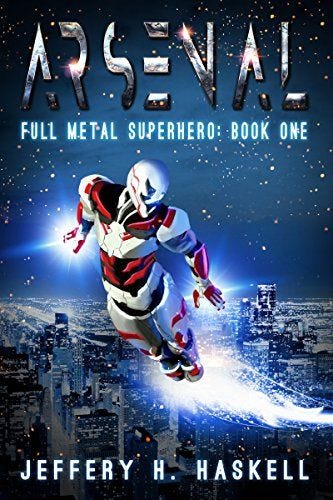In 2017, Jeffrey H. Haskell published the first in a nine-volume series called Full Metal Superhero, starring a young female lead who was one-half Oracle (DC) and one-half Iron Man (Marvel.) As this was the same year that Marvel was at its peak and DC was trying to get people hyped for the forthcoming Justice League movie, a series like this was well-poised for success, ready to feed off of two audiences.
Although we now live in a world so over-saturated with superhero movies that not even Paul Rudd can get butts in seats for Ant-Man 6: The Search For Any Remaining Fandom, it’s nice to know there are still writers taking the genre seriously.
The Story
Amelia Lockheart has genius-level intellect and a sizeable bank account. (Although she lacks the philanthropy and playboy-ism of a certain goateed counterpart.) She’s wheelchair-bound, and has been ever since age 6 when her family was in a car accident. In that same accident her parents were carted off by Shady Officials(TM), and a post-surgery Amelia was assured that they died in the crash.
She knows that story is crap, she just needs the means and opportunity to prove it. By age 20 she’s built her own high-tech power armor and is trying to work her way onto a government-endorsed superhero militia so she can use state information to find her parents.
After so many decades of comics and movies, the superhero genre has established not only tropes, but cliched storylines as well. I liked that Haskell only gave the tropes/building blocks as much time as they really needed, and instead focused on a story that we haven’t already seen a hundred times. This book felt familiar and accessible, while not being completely predictable.
The Characters
Since Haskell wrote this in first-person present tense, getting the protagonist right was a must. Amelia has to be competent and likeable, while still having flaws, and she shows all of those things in spades. Her super-genius intellect is often credited as a superpower of its own (an idea she doesn’t agree with), yet she’s still capable of overlooking things and making mistakes in a very human way. She’s humble enough to realize that and even be hard on herself when it happens.
The supporting cast of characters is also grounded and enjoyable, without falling into clichés. The Diamondbacks—Arizona’s superhero militia—consist of Major Force, Domino, Mister Perfect, and more. So right out the gate you’ve got potential analogs for Captain America, Jean Gray, and Doctor Strange, but none of the characters come off like that.
Yes, Major Force is a former Marine with super strength and the like, but character-wise he’s not a vanilla Boy Scout. If anything he’s your average modern man, and he has superpowers, and he takes his job seriously. I could still admire him as a character without feeling overly attached to an anachronism. That’s pretty much how the other heroes manifested too. Everything felt grounded, even in a spectacular setting where people have superpowers.
Speaking of the setting…
The World
More than once I got the feeling that Haskell had read THE LAW OF SUPERHEROES before crafting this world. Whether he did or not, the setting shows a world of metahumans existing within the legal framework of the U.S. Constitution. How do Federal heroes work? How are state militias organized? Is vigilantism legal? All of these questions have functional answers, proving that he put thought into it without spending a ton of time over-explaining it all.
Tech-wise, things are a short distance into the future. You’ve got a few more Elon-Musk-Types running around, inventing bonkers stuff that elites have access to (teleporters, for example), and a big battle at the end sees the Diamondbacks duking it out with a 150 foot-tall tentacle monster near the U.S./Mexico border. But I liked how it all took itself seriously, and we weren’t getting tongue-in-cheek pontification from Amelia or any of the other characters. They had real reactions to this stuff and that made it all more immersive.
The Politics
None
Content
Mild side of PG-13 on the language and combat violence, and some characters have pheromone-based superpowers that add to their augmented persuasion. Tastefully dabbles with sensuality, doesn’t go overboard.
Who’s it for?
Basically if you saw a Marvel movie in the last fifteen years and liked it, this will remind you of why. If you saw a Marvel movie in the last three years and it sucked (let’s just be real) this will get the taste out of your mouth.
Why read it?
Personally, I liked remembering that this genre doesn’t have to be dead. You could tell this kind of story (an orphan doesn’t believe the official story about her parents’ death) in any genre, but dressing it up in power armor and giving it a callsign feels like a fresh take.





I have read the entire series, and it is excellent. The only serious competition is the "Wearing the Cape" series by Harmon.
The follow-on "Wraith" series (same world, different character(s)) is more uneven, and much darker.